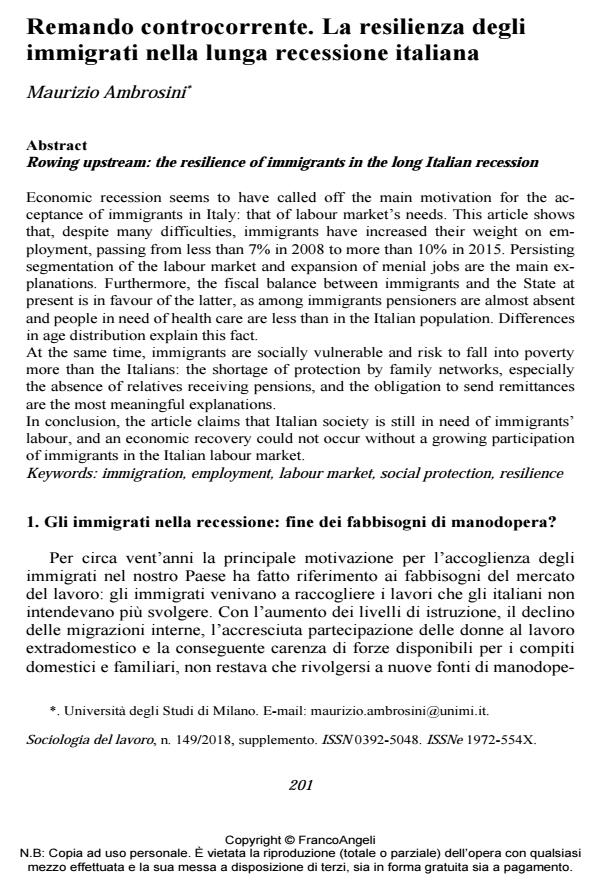Rowing upstream: the resilience of immigrants in the long Italian recession
Journal title SOCIOLOGIA DEL LAVORO
Author/s Maurizio Ambrosini
Publishing Year 2018 Issue 2018/149 suppl.
Language Italian Pages 15 P. 201-215 File size 233 KB
DOI 10.3280/SL2018-149S14
DOI is like a bar code for intellectual property: to have more infomation
click here
Below, you can see the article first page
If you want to buy this article in PDF format, you can do it, following the instructions to buy download credits

FrancoAngeli is member of Publishers International Linking Association, Inc (PILA), a not-for-profit association which run the CrossRef service enabling links to and from online scholarly content.
Economic recession seems to have called off the main motivation for the acceptance of immigrants in Italy: that of labour market’s needs. This article shows that, despite many difficulties, immigrants have increased their weight on employment, passing from less than 7% in 2008 to more than 10% in 2015. Persisting segmentation of the labour market and expansion of menial jobs are the main explanations. Furthermore, the fiscal balance between immigrants and the State at present is in favour of the latter, as among immigrants pensioners are almost absent and people in need of health care are less than in the Italian population. Differences in age distribution explain this fact. At the same time, immigrants are socially vulnerable and risk to fall into poverty more than the Italians: the shortage of protection by family networks, especially the absence of relatives receiving pensions, and the obligation to send remittances are the most meaningful explanations. In conclusion, the article claims that Italian society is still in need of immigrants’ labour, and an economic recovery could not occur without a growing participation of immigrants in the Italian labour market.
Keywords: Immigration, employment, labour market, social protection, resilience
- La subalternità al tempo della crisi. Le differenze di reddito tra lavoratori stranieri e nativi in Italia in una prospettiva comparata Fabio Berti, Antonella D’Agostino, Caterina Francesca Guidi, Andrea Regoli, Andrea Valzania, in MONDI MIGRANTI 3/2022 pp.163
DOI: 10.3280/MM2022-003009
Maurizio Ambrosini, Remando controcorrente. La resilienza degli immigrati nella lunga recessione italiana in "SOCIOLOGIA DEL LAVORO " 149 suppl./2018, pp 201-215, DOI: 10.3280/SL2018-149S14